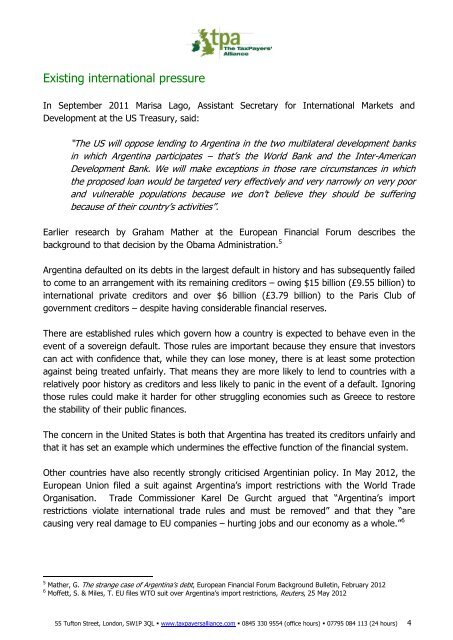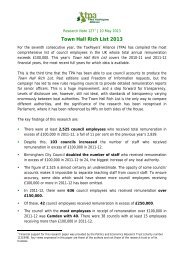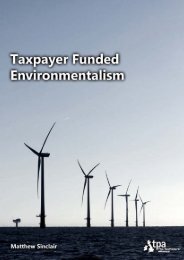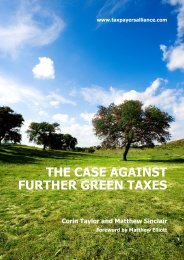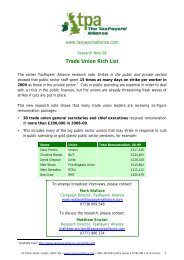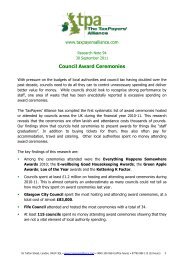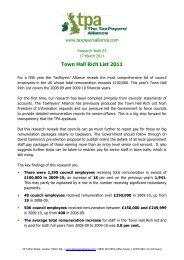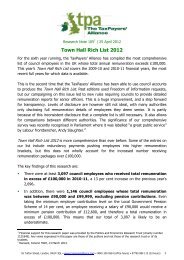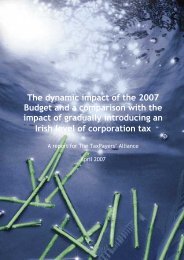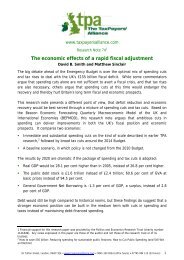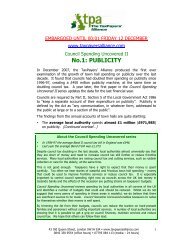details about financial assistance to Argentina - The TaxPayers ...
details about financial assistance to Argentina - The TaxPayers ...
details about financial assistance to Argentina - The TaxPayers ...
You also want an ePaper? Increase the reach of your titles
YUMPU automatically turns print PDFs into web optimized ePapers that Google loves.
Existing international pressure<br />
In September 2011 Marisa Lago, Assistant Secretary for International Markets and<br />
Development at the US Treasury, said:<br />
“<strong>The</strong> US will oppose lending <strong>to</strong> <strong>Argentina</strong> in the two multilateral development banks<br />
in which <strong>Argentina</strong> participates – that’s the World Bank and the Inter-American<br />
Development Bank. We will make exceptions in those rare circumstances in which<br />
the proposed loan would be targeted very effectively and very narrowly on very poor<br />
and vulnerable populations because we don’t believe they should be suffering<br />
because of their country’s activities”.<br />
Earlier research by Graham Mather at the European Financial Forum describes the<br />
background <strong>to</strong> that decision by the Obama Administration. 5<br />
<strong>Argentina</strong> defaulted on its debts in the largest default in his<strong>to</strong>ry and has subsequently failed<br />
<strong>to</strong> come <strong>to</strong> an arrangement with its remaining credi<strong>to</strong>rs – owing $15 billion (£9.55 billion) <strong>to</strong><br />
international private credi<strong>to</strong>rs and over $6 billion (£3.79 billion) <strong>to</strong> the Paris Club of<br />
government credi<strong>to</strong>rs – despite having considerable <strong>financial</strong> reserves.<br />
<strong>The</strong>re are established rules which govern how a country is expected <strong>to</strong> behave even in the<br />
event of a sovereign default. Those rules are important because they ensure that inves<strong>to</strong>rs<br />
can act with confidence that, while they can lose money, there is at least some protection<br />
against being treated unfairly. That means they are more likely <strong>to</strong> lend <strong>to</strong> countries with a<br />
relatively poor his<strong>to</strong>ry as credi<strong>to</strong>rs and less likely <strong>to</strong> panic in the event of a default. Ignoring<br />
those rules could make it harder for other struggling economies such as Greece <strong>to</strong> res<strong>to</strong>re<br />
the stability of their public finances.<br />
<strong>The</strong> concern in the United States is both that <strong>Argentina</strong> has treated its credi<strong>to</strong>rs unfairly and<br />
that it has set an example which undermines the effective function of the <strong>financial</strong> system.<br />
Other countries have also recently strongly criticised Argentinian policy. In May 2012, the<br />
European Union filed a suit against <strong>Argentina</strong>’s import restrictions with the World Trade<br />
Organisation. Trade Commissioner Karel De Gurcht argued that “<strong>Argentina</strong>’s import<br />
restrictions violate international trade rules and must be removed” and that they “are<br />
causing very real damage <strong>to</strong> EU companies – hurting jobs and our economy as a whole.” 6<br />
5 Mather, G. <strong>The</strong> strange case of <strong>Argentina</strong>’s debt, European Financial Forum Background Bulletin, February 2012<br />
6 Moffett, S. & Miles, T. EU files WTO suit over <strong>Argentina</strong>’s import restrictions, Reuters, 25 May 2012<br />
55 Tuf<strong>to</strong>n Street, London, SW1P 3QL • www.taxpayersalliance.com • 0845 330 9554 (office hours) • 07795 084 113 (24 hours) 4


